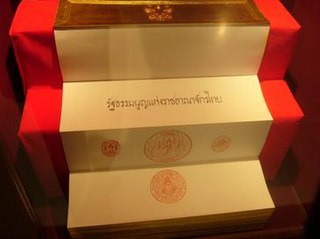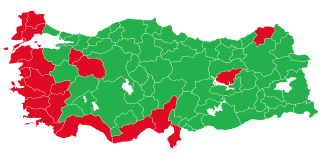
The President of the Hellenic Republic, colloquially referred to in English as the President of Greece, is the head of state of Greece. The President is elected by the Hellenic Parliament, and his role is mostly ceremonial since the 1986 constitutional reform. The office was formally established by the Constitution of Greece in 1975, but has antecedents in the Second Hellenic Republic of 1924–1935 and the republic established by the Greek military junta in 1973–1974. The incumbent, since 2015, is Prokopis Pavlopoulos, serving his first term in office.

The Constitution of Colombia, better known as the Constitution of 1991, is the current governing document of the Republic of Colombia. Promulgated on July 4, 1991, it replaced the Constitution of 1886. It is Colombia's ninth constitution since 1830. See a timeline of all previous constitutions and amendments here. It has recently been called the Constitution of Rights.

The Constitution of the Kingdom of Thailand provides the basis for the rule of law in Thailand.
The Constitution of the Kingdom of Thailand (Interim), Buddhist Era 2549 (2006) was an interim constitution of Thailand enacted to replace the 1997 Constitution which was repealed by the Council for Democratic Reform (CDR) after it seized power from the government of Thaksin Shinawatra in the 2006 Thailand coup. Released on 27 September 2006 and promulgated on 1 October 2006, the Constitution allowed the junta to retain significant control over the appointed civilian government and the drafting of a permanent constitution. The CDR would be transformed into a permanent Council for National Security (CNS) and would appoint the head of the executive branch, the entire legislature, and the drafters of a permanent constitution. The Constitution made no mention of succession, instead leaving it to "constitutional practice." The draft came under strong public criticism as being a step backwards from the 1997 "People's Constitution". The constitution did not repeal junta bans restricting freedom of speech, assembly, and political activity; these bans were subsequently revoked by an act on 27 December 2006.

The Constitution of the Kingdom of Thailand, Buddhist Era 2550 (2007) was the constitution of Thailand which was in effect from 2007 to 2014.

A constitutional referendum was held in Greece on 29 July 1973. The amendments would abolish the monarchy and establish a republic. The proposal was approved by 78.6% of voters with a turnout of 75.0%. This initiated the first period of the Metapolitefsi.
A constitutional referendum was held in Greece on 15 November 1968. Voters were asked whether they wished to ratify a new constitution prepared by the dictatorial regime. It was approved by 92.1% of voters, with a voter turnout of 77.7%.
National Front was a period in the history of Colombia in which the two main political parties, the Liberal Party and the Conservative Party, agreed to rotate power, intercalating for a period of four presidential terms. The National Front Presidents were Alberto Lleras Camargo (Liberal), Guillermo León Valencia (Conservative), Carlos Lleras Restrepo (Liberal), and Misael Pastrana Borrero (Conservative).

The constitutional history of Colombia is the process of formation and evolution of the different constitutions that Colombia has had since its formation.

The Colombian Constitution of 1886 was the constitution that created the Republic of Colombia. Before 1886, the country was called United States of Colombia. The coalition of moderate Liberals and Conservatives that ended the liberal hegemony and placed Rafael Nuñez in power repealed the Constitution of Rionegro and substituted the constitution of 1886. From then on, the country was officially called the Republic of Colombia.

The Republic of Niger has had seven constitutions, two substantial constitutional revisions, and two periods of rule by decree since its independence from French colonial rule in 1960. The current "Seventh Republic" operates under the Constitution of 2010.

The Constitution of the Republic of the Union of Myanmar is the supreme law of Myanmar. Myanmar's first constitution adopted by constituent assembly was enacted for the Union of Burma in 1947. After the 1962 Burmese coup d'état, a second constitution was enacted in 1974. The country has been ruled by military juntas for most of its history.

The Argentine general election of 1958 was held on 23 February. Voters chose both the President and their legislators and with a turnout of 90.9%, it produced the following results:

A constitutional referendum on a number of changes to the constitution was held in Turkey on 12 September 2010. The results showed the majority supported the constitutional amendments, with 58% in favour and 42% against. The changes were aimed at bringing the constitution into compliance with European Union standards. Supporters of Turkish EU membership hope constitutional reform will facilitate the membership process.
Constitutional Assembly elections were held in Venezuela on 30 November 1952. After its election, the Assembly would nominate a provisional president and then draft a new constitution. Although taking place under military dictatorship, with the main opposition party banned, the election was fair enough to permit early results showing an unexpected defeat for the ruling military junta as the Democratic Republican Union won 62.8% of the vote. The junta blocked the final results from being published and installed General Marcos Pérez Jiménez as Provisional President, an outcome confirmed by the Constitutional Assembly, which the opposition parties boycotted.

A referendum on electing a Constitutional Assembly was held in Colombia on 27 May 1990 alongside presidential elections. The proposal was approved by 96% of voters. A Constitutional Assembly was later elected in December 1990 and produced the 1991 constitution.

Constitutional Assembly elections were held in Colombia on 9 December 1990 alongside a referendum on the Assembly itself. The Assembly sat from February to July 1991 and drew up the 1991 constitution.

A fifteen-part constitutional referendum was held in Colombia on 25 October 2003. Whilst all fifteen proposals were approved by voters, only one question had a sufficient numbers of votes to pass the 25% quorum requirement.

The history of Thailand since 2001 has been dominated by the politics surrounding the rise and fall from power of former Prime Minister Thaksin Shinawatra and the subsequent conflicts between his supporters and opponents. Thaksin and his Thai Rak Thai Party came to power in 2001 and became very popular among the electorate, especially rural voters. Opponents, however, criticized his authoritarian style and accused him of corruption. Thaksin was deposed in a coup d'état in 2006, and Thailand has since been embroiled in continuing rounds of political crisis involving elections won by Thaksin's supporters, massive anti-government protests by multiple factions, removals of prime ministers and disbanding of political parties by the judiciary, and two military coups.

A constitutional referendum was held in Thailand on 7 August 2016. The charter offered only semi-democracy and was seen to tighten military rule in Thailand. However, it was approved by 61% of voters with a 59% turnout. A second proposal for the next Prime Minister to be jointly elected by Senators and MPs was also approved. However, the opposition groups to the constitution were barred from formally campaigning against it by the military government, while the military government actively campaigned for its adoption.















